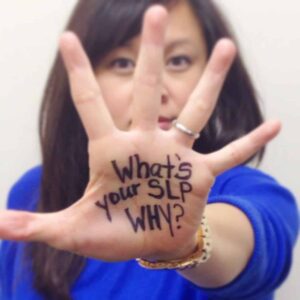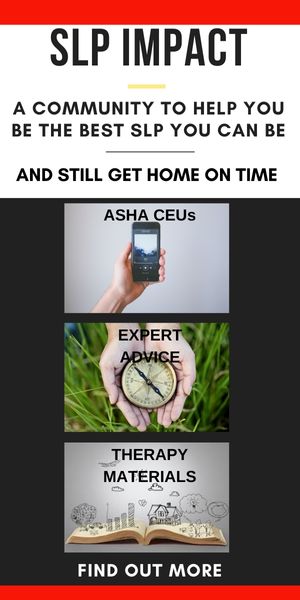What’s it like to be a speech-language pathologist? Well, it’s the month of May. For some, it’s merely the fifth month of the year. For us as SLPs, we are in the thick of it. Evaluations and reports are amping up, timelines are getting much too short, sweat stains are making repeated appearances and our human (and SLP) reserves are running low. So today, friends, I am thinking about you.
 The Good.
The Good.
You chose to be a speech-language pathologist for an important reason. So, why did you do it? Maria said, “I am a speech pathologist because I want to empower others–so that they can ultimately empower themselves using their words and others’ words as tools for their learning and growth.” Scott said, ” I am energized that I did some good, connected with someone, and pulled them forward.” Alisa’s SLP why began with her own narrative. “Moving to the US as a child, and growing up in a bilingual/bicultural home, I realized I wanted to use the languages that I know to help children with language disorders and be able to support them in their native tongue.” There are many reasons, and they are all honored. What is your SLP Why?
The Hard.
Here’s the thing. You can love, love, love your job and fully acknowledge that there are some really tough days. Truth be told, these days happen often.
There are days when I leave work crying.
There are days when the paperwork is stacked so high.
There are days when my student did not make progress.
There are days when I spend hours in the evening writing a report.
There are days when I don’t feel smart enough.
The Reason.
Then, I remember. I remember all of those faces. I remember John. I met him in graduate school as a fourth grader, and I served him for two years. I still keep in touch with his family. I remember Jessie. I worked with him for four years on his narrative and conversational skills. On our final session, we talked and laughed about everything and nothing–it was lovely and meaningful. I remember Mary*. We worked on her thoughts and feelings about stuttering. When it was time to work on her career project, I expected her to do her research on being a basketball player. She shook her head. “What are you going to be then?” I asked. ” “You. I want to be you. I want to empower people.”
To be a speech-language pathologist is to make a difference. We make a meaningful difference. So, now, sit back and listen to some mediocre raps. This was written with SLP-love and admiration. This moment is sponsored by the Letter B. So, SLPs, drop me a Beat.




As a RETIRED SLP after 40 years of service in the PUBLIC SCHOOLS- THANK YOU FOR A GREAT TRIBUTE TO ALL COLLEAGUES WHO KEEP CHANGING THE WORLD!
Sharon,
Thank you, always, for the time you gave to the profession. Also, thank you for your continual positive words for our work. We tuck it away and know that it’s appreciated. And, you are right. Our SLPs are changing the world. I believe this every time I enter a session. Enjoy your retirement as an SLP–gut tells me once an SLP…always an SLP. You’ve earned this reprieve from our valuable, worthy field.
Oh, Phuong, you are my spirit animal!! It was such a blessing/treat to get you hear you speak (for the second time) at TSHA this year! Thank you for this added boost and the reminder to keep our SLP why close at hand <3
Angela! Yes, yes, yes. Rememeber your SLP-Why. Whisper it, speak it, yell it, live it, dear. What you do, do, do makes an important difference. SLP-on!
Thank you! A great boost on a CRAZY Friday in May. Sending Light & Love your way!
We will surely take the Light and Love. It is a crazy time of year, and the SLP-hustle (and game) is strong. Sending positive vibes for you, Sonia. You got this–one session, IEP meeting, report, progress note, Medicaid billing at a time.
My nephew is having a large time learning how to speak. It is good to know that a speech pathologist can help him learn how to speed. It is good to know that they can also help people who don’t speak English as their first language.
Thanks for sharing.